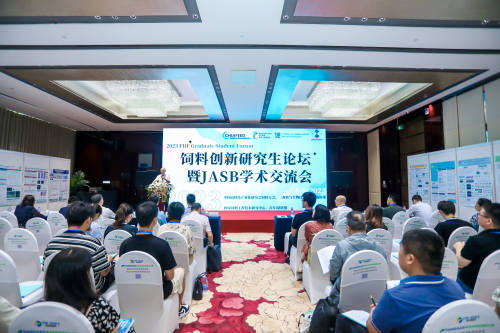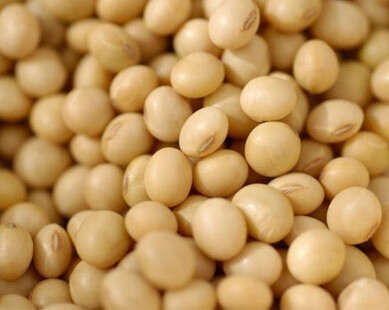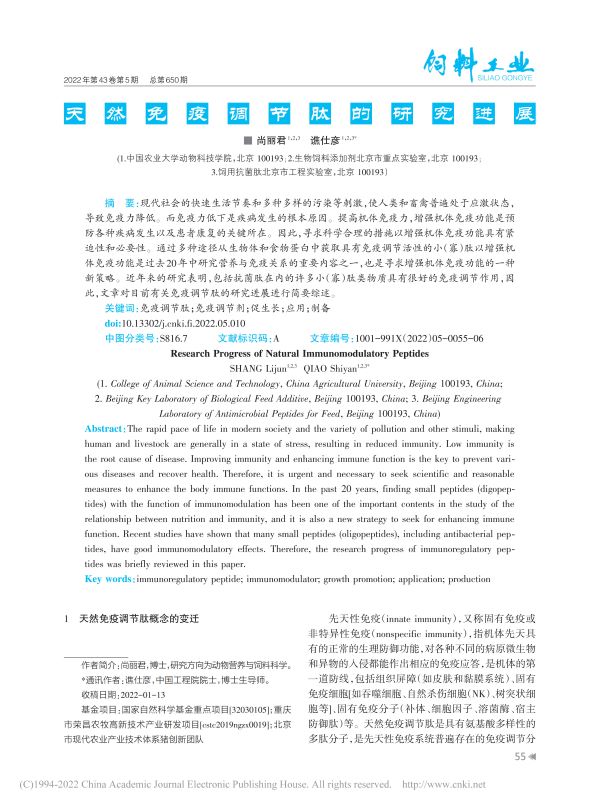科研进展
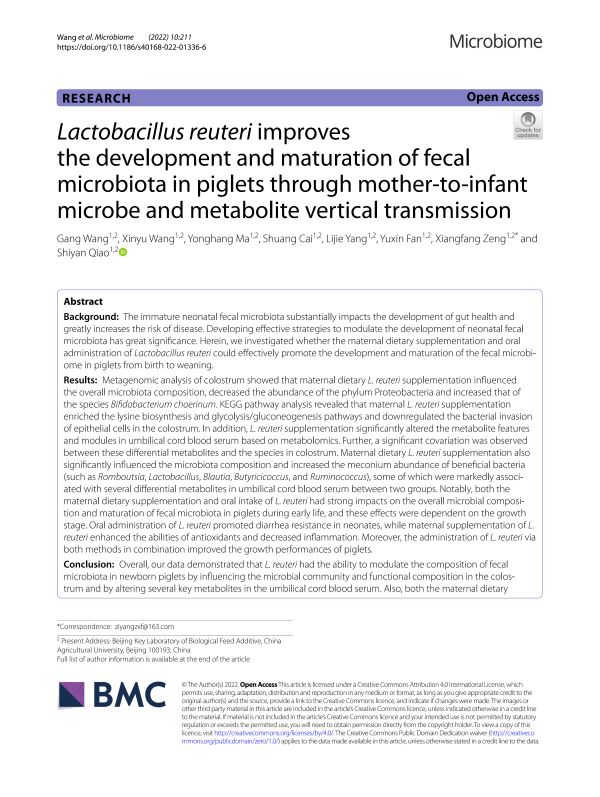
15
2023-09
Lactobacillus reuteri improves the development and maturation of fecal microbiota in piglets through mother-to-infant microbe and metabolite vertical transmission
Background: The immature neonatal fecal microbiota substantially impacts the development of gut health and
greatly increases the risk of disease. Developing efective strategies to modulate the development of neonatal fecal
microbiota has great signifcance. Herein, we investigated whether the maternal dietary supplementation and oral
administration of Lactobacillus reuteri could efectively promote the development and maturation of the fecal microbiome in piglets from birth to weaning.
Results: Metagenomic analysis of colostrum showed that maternal dietary L. reuteri supplementation infuenced
the overall microbiota composition, decreased the abundance of the phylum Proteobacteria and increased that of
the species Bifdobacterium choerinum. KEGG pathway analysis revealed that maternal L. reuteri supplementation
enriched the lysine biosynthesis and glycolysis/gluconeogenesis pathways and downregulated the bacterial invasion
of epithelial cells in the colostrum. In addition, L. reuteri supplementation signifcantly altered the metabolite features
and modules in umbilical cord blood serum based on metabolomics. Further, a signifcant covariation was observed
between these diferential metabolites and the species in colostrum. Maternal dietary L. reuteri supplementation also
signifcantly infuenced the microbiota composition and increased the meconium abundance of benefcial bacteria
(such as Romboutsia, Lactobacillus, Blautia, Butyricicoccus, and Ruminococcus), some of which were markedly associated with several diferential metabolites in umbilical cord blood serum between two groups. Notably, both the
maternal dietary supplementation and oral intake of L. reuteri had strong impacts on the overall microbial composition and maturation of fecal microbiota in piglets during early life, and these efects were dependent on the growth
stage. Oral administration of L. reuteri promoted diarrhea resistance in neonates, while maternal supplementation of L.
reuteri enhanced the abilities of antioxidants and decreased infammation. Moreover, the administration of L. reuteri via
both methods in combination improved the growth performances of piglets.
Conclusion: Overall, our data demonstrated that L. reuteri had the ability to modulate the composition of fecal
microbiota in newborn piglets by infuencing the microbial community and functional composition in the colostrum and by altering several key metabolites in the umbilical cord blood serum. Also, both the maternal dietary
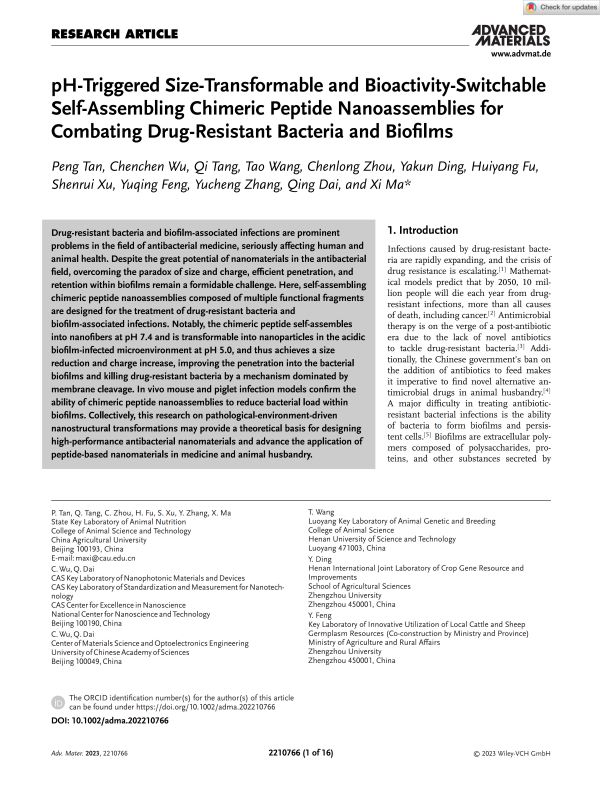
15
2023-09
pH-Triggered Size-Transformable and Bioactivity-Switchable Self-Assembling Chimeric Peptide Nanoassemblies for Combating Drug-Resistant Bacteria and Biofilms
Drug-resistant bacteria and biofilm-associated infections are prominent
problems in the field of antibacterial medicine, seriously affecting human and
animal health. Despite the great potential of nanomaterials in the antibacterial
field, overcoming the paradox of size and charge, efficient penetration, and
retention within biofilms remain a formidable challenge. Here, self-assembling
chimeric peptide nanoassemblies composed of multiple functional fragments
are designed for the treatment of drug-resistant bacteria and
biofilm-associated infections. Notably, the chimeric peptide self-assembles
into nanofibers at pH 7.4 and is transformable into nanoparticles in the acidic
biofilm-infected microenvironment at pH 5.0, and thus achieves a size
reduction and charge increase, improving the penetration into the bacterial
biofilms and killing drug-resistant bacteria by a mechanism dominated by
membrane cleavage. In vivo mouse and piglet infection models confirm the
ability of chimeric peptide nanoassemblies to reduce bacterial load within
biofilms. Collectively, this research on pathological-environment-driven
nanostructural transformations may provide a theoretical basis for designing
high-performance antibacterial nanomaterials and advance the application of
peptide-based nanomaterials in medicine and animal husbandry.
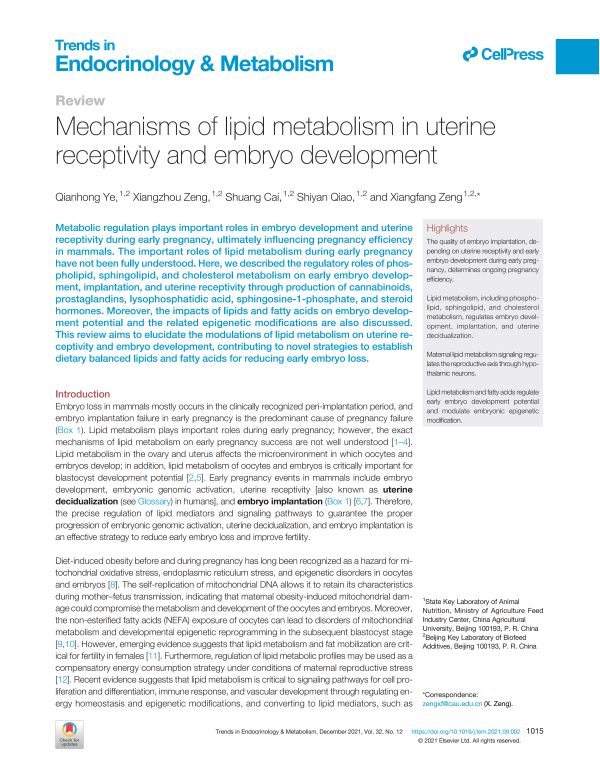
15
2023-09
Mechanisms of lipid metabolism in uterine receptivity and embryo development
Metabolic regulation plays important roles in embryo development and uterine
receptivity during early pregnancy, ultimately influencing pregnancy efficiency
in mammals. The important roles of lipid metabolism during early pregnancy
have not been fully understood. Here, we described the regulatory roles of phospholipid, sphingolipid, and cholesterol metabolism on early embryo development, implantation, and uterine receptivity through production of cannabinoids,
prostaglandins, lysophosphatidic acid, sphingosine-1-phosphate, and steroid
hormones. Moreover, the impacts of lipids and fatty acids on embryo development potential and the related epigenetic modifications are also discussed.
This review aims to elucidate the modulations of lipid metabolism on uterine receptivity and embryo development, contributing to novel strategies to establish
dietary balanced lipids and fatty acids for reducing early embryo loss.
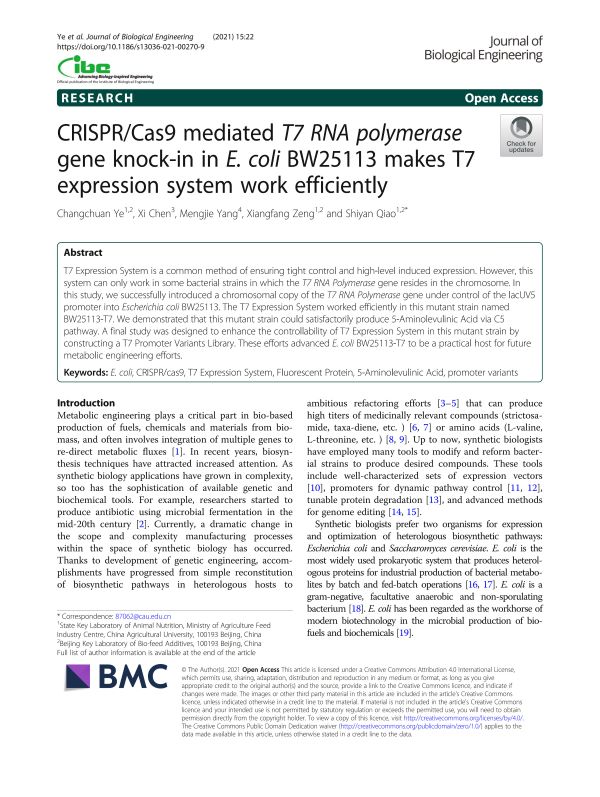
15
2023-09
CRISPR/Cas9 mediated T7 RNA polymerase gene knock-in in E. coli BW25113 makes T7 expression system work efficiently
T7 Expression System is a common method of ensuring tight control and high-level induced expression. However, this
system can only work in some bacterial strains in which the T7 RNA Polymerase gene resides in the chromosome. In
this study, we successfully introduced a chromosomal copy of the T7 RNA Polymerase gene under control of the lacUV5
promoter into Escherichia coli BW25113. The T7 Expression System worked efficiently in this mutant strain named
BW25113-T7. We demonstrated that this mutant strain could satisfactorily produce 5-Aminolevulinic Acid via C5
pathway. A final study was designed to enhance the controllability of T7 Expression System in this mutant strain by
constructing a T7 Promoter Variants Library. These efforts advanced E. coli BW25113-T7 to be a practical host for future
metabolic engineering efforts.
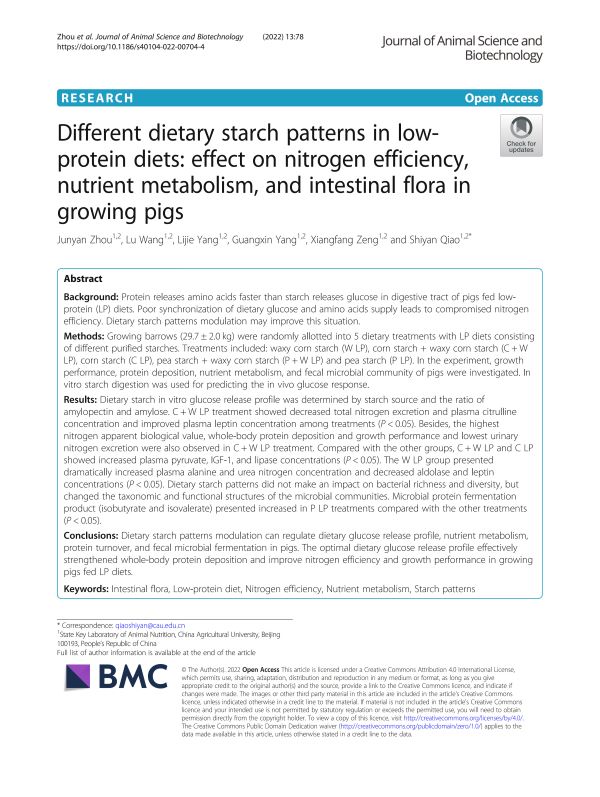
15
2023-09
Different dietary starch patterns in lowprotein diets: effect on nitrogen efficiency,nutrient metabolism, and intestinal flora in growing pigs
Background: Protein releases amino acids faster than starch releases glucose in digestive tract of pigs fed lowprotein (LP) diets. Poor synchronization of dietary glucose and amino acids supply leads to compromised nitrogen
efficiency. Dietary starch patterns modulation may improve this situation.
Methods: Growing barrows (29.7 ± 2.0 kg) were randomly allotted into 5 dietary treatments with LP diets consisting
of different purified starches. Treatments included: waxy corn starch (W LP), corn starch + waxy corn starch (C + W
LP), corn starch (C LP), pea starch + waxy corn starch (P + W LP) and pea starch (P LP). In the experiment, growth
performance, protein deposition, nutrient metabolism, and fecal microbial community of pigs were investigated. In
vitro starch digestion was used for predicting the in vivo glucose response.
Results: Dietary starch in vitro glucose release profile was determined by starch source and the ratio of
amylopectin and amylose. C + W LP treatment showed decreased total nitrogen excretion and plasma citrulline
concentration and improved plasma leptin concentration among treatments (P < 0.05). Besides, the highest
nitrogen apparent biological value, whole-body protein deposition and growth performance and lowest urinary
nitrogen excretion were also observed in C + W LP treatment. Compared with the other groups, C + W LP and C LP
showed increased plasma pyruvate, IGF-1, and lipase concentrations (P < 0.05). The W LP group presented
dramatically increased plasma alanine and urea nitrogen concentration and decreased aldolase and leptin
concentrations (P < 0.05). Dietary starch patterns did not make an impact on bacterial richness and diversity, but
changed the taxonomic and functional structures of the microbial communities. Microbial protein fermentation
product (isobutyrate and isovalerate) presented increased in P LP treatments compared with the other treatments
(P < 0.05).
Conclusions: Dietary starch patterns modulation can regulate dietary glucose release profile, nutrient metabolism,
protein turnover, and fecal microbial fermentation in pigs. The optimal dietary glucose release profile effectively
strengthened whole-body protein deposition and improve nitrogen efficiency and growth performance in growing
pigs fed LP diets.
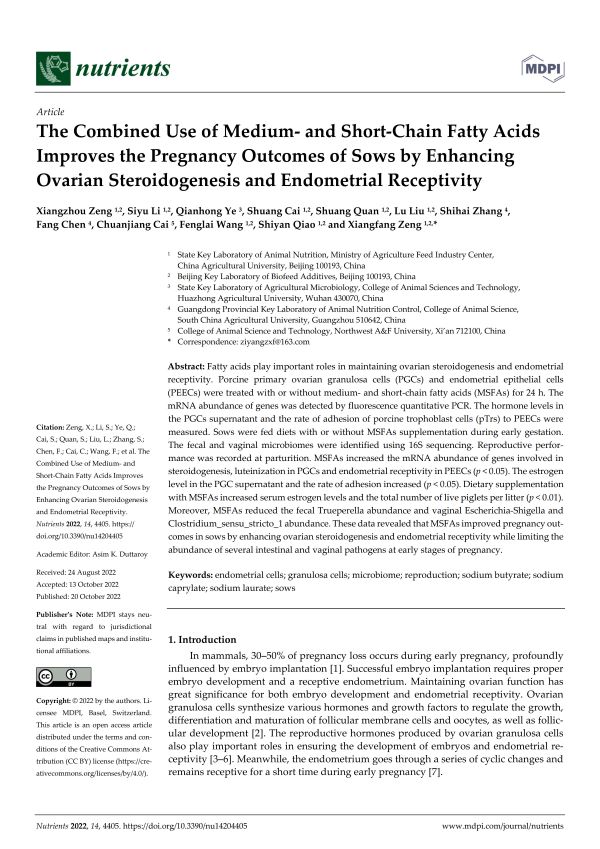
15
2023-09
The Combined Use of Medium- and Short-Chain Fatty Acids Improves the Pregnancy Outcomes of Sows by Enhancing Ovarian Steroidogenesis and Endometrial Receptivity
Fatty acids play important roles in maintaining ovarian steroidogenesis and endometrial
receptivity. Porcine primary ovarian granulosa cells (PGCs) and endometrial epithelial cells
(PEECs) were treated with or without medium- and short-chain fatty acids (MSFAs) for 24 h. The
mRNA abundance of genes was detected by fluorescence quantitative PCR. The hormone levels in
the PGCs supernatant and the rate of adhesion of porcine trophoblast cells (pTrs) to PEECs were
measured. Sows were fed diets with or without MSFAs supplementation during early gestation.
The fecal and vaginal microbiomes were identified using 16S sequencing. Reproductive performance was recorded at parturition. MSFAs increased the mRNA abundance of genes involved in
steroidogenesis, luteinization in PGCs and endometrial receptivity in PEECs (p < 0.05). The estrogen
level in the PGC supernatant and the rate of adhesion increased (p < 0.05). Dietary supplementation
with MSFAs increased serum estrogen levels and the total number of live piglets per litter (p < 0.01).
Moreover, MSFAs reduced the fecal Trueperella abundance and vaginal Escherichia-Shigella and
Clostridium_sensu_stricto_1 abundance. These data revealed that MSFAs improved pregnancy outcomes in sows by enhancing ovarian steroidogenesis and endometrial receptivity while limiting the
abundance of several intestinal and vaginal pathogens at early stages of pregnancy.
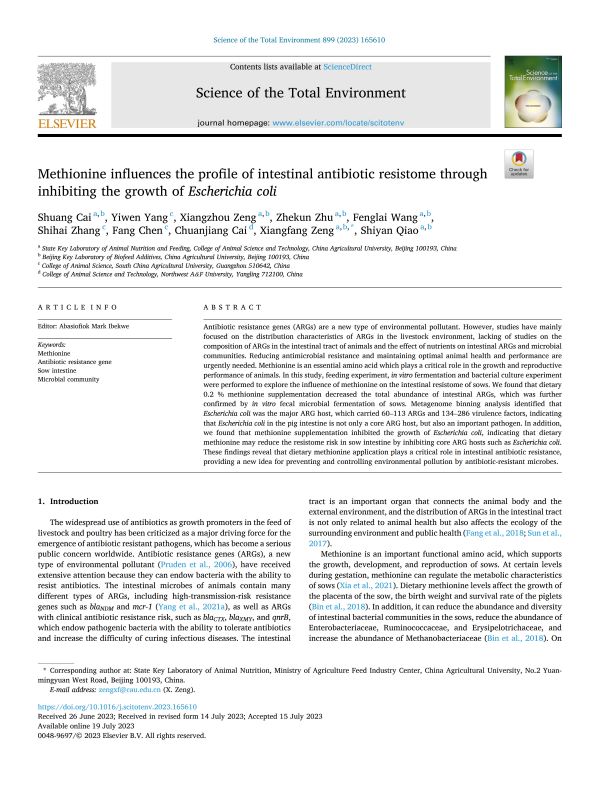
15
2023-09
Methionine influences the profile of intestinal antibiotic resistome through inhibiting the growth of Escherichia coli
Antibiotic resistance genes (ARGs) are a new type of environmental pollutant. However, studies have mainly
focused on the distribution characteristics of ARGs in the livestock environment, lacking of studies on the
composition of ARGs in the intestinal tract of animals and the effect of nutrients on intestinal ARGs and microbial
communities. Reducing antimicrobial resistance and maintaining optimal animal health and performance are
urgently needed. Methionine is an essential amino acid which plays a critical role in the growth and reproductive
performance of animals. In this study, feeding experiment, in vitro fermentation and bacterial culture experiment
were performed to explore the influence of methionine on the intestinal resistome of sows. We found that dietary
0.2 % methionine supplementation decreased the total abundance of intestinal ARGs, which was further
confirmed by in vitro fecal microbial fermentation of sows. Metagenome binning analysis identified that
Escherichia coli was the major ARG host, which carried 60–113 ARGs and 134–286 virulence factors, indicating
that Escherichia coli in the pig intestine is not only a core ARG host, but also an important pathogen. In addition,
we found that methionine supplementation inhibited the growth of Escherichia coli, indicating that dietary
methionine may reduce the resistome risk in sow intestine by inhibiting core ARG hosts such as Escherichia coli.
These findings reveal that dietary methionine application plays a critical role in intestinal antibiotic resistance,
providing a new idea for preventing and controlling environmental pollution by antibiotic-resistant microbes.
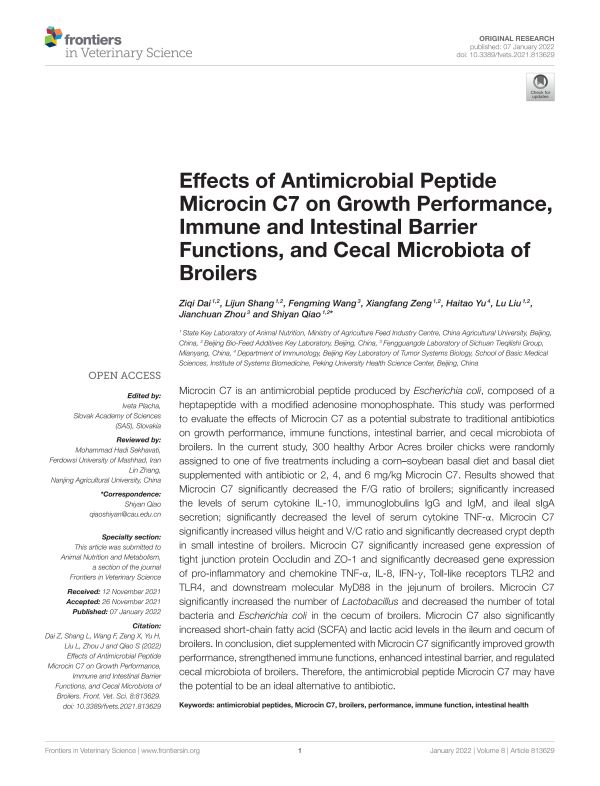
15
2023-09
Effects of Antimicrobial PeptideMicrocin C7 on Growth Performance.Immune and Intestinal BarrierFunctions, and Cecal Microbiota ofBroilers
1 State Key Laboratory of Animal Nutrition, Ministry of Agriculture Feed Industry Centre, China Agricultural University, Beijing,
China, 2 Beijing Bio-Feed Additives Key Laboratory, Beijing, China,
3 Fengguangde Laboratory of Sichuan Tieqilishi Group,
Mianyang, China, 4 Department of Immunology, Beijing Key Laboratory of Tumor Systems Biology, School of Basic Medical
Sciences, Institute of Systems Biomedicine, Peking University Health Science Center, Beijing, China
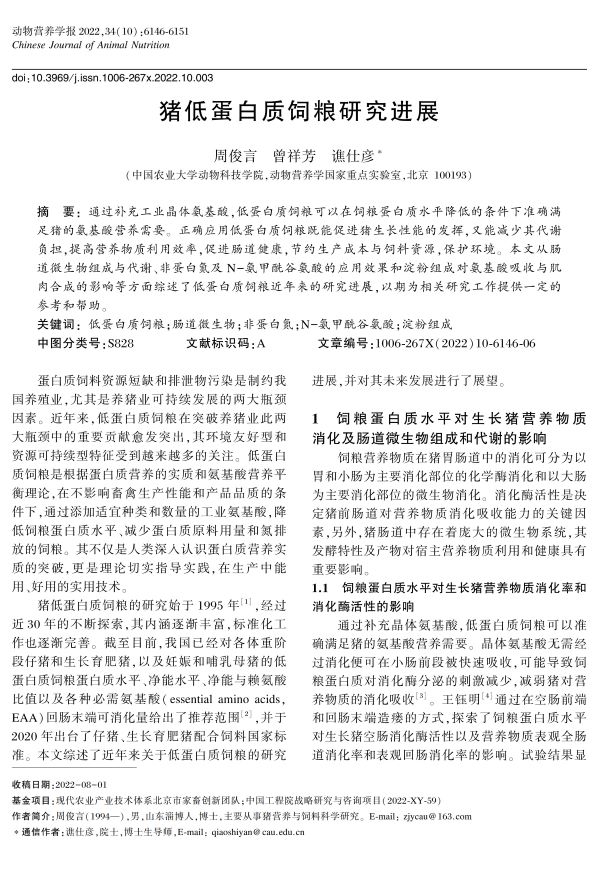
15
2023-09
猪低蛋白质饲粮研究进展
通过补充工业晶体氨基酸,低蛋白质饲粮可以在饲粮蛋白质水平降低的条件下准确满
足猪的氨基酸营养需要。 正确应用低蛋白质饲粮既能促进猪生长性能的发挥,又能减少其代谢
负担,提高营养物质利用效率,促进肠道健康,节约生产成本与饲料资源,保护环境。 本文从肠
道微生物组成与代谢、非蛋白氮及 N-氨甲酰谷氨酸的应用效果和淀粉组成对氨基酸吸收与肌
肉合成的影响等方面综述了低蛋白质饲粮近年来的研究进展,以期为相关研究工作提供一定的
参考和帮助。



